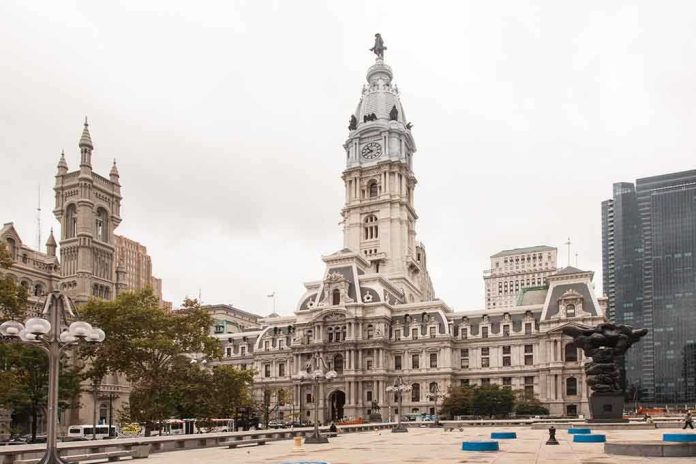
A major city’s progressive prosecutor is daring President Trump to bring federal law enforcement to Philadelphia—just as a retired judge switches parties to challenge his grip on justice, signaling a high-stakes showdown over law, order, and the Constitution.
Story Snapshot
- Philadelphia DA Larry Krasner publicly warns President Trump not to impose federal control over city policing after Trump’s D.C. intervention.
- Trump’s federal takeover of D.C. police and National Guard deployment reignite debates over constitutional authority and local autonomy.
- A retired judge has switched parties to run against Krasner in November, intensifying the battle over Philadelphia’s criminal justice direction.
- The clash spotlights the broader national struggle between law-and-order federal policies and progressive local reforms.
Trump’s Federal Law Enforcement Push Faces Local Resistance
On August 11, 2025, President Trump announced a federal takeover of Washington, D.C.’s police and deployed the National Guard, asserting the move was necessary to restore order and public safety. This unprecedented intervention placed local law enforcement directly under federal control—a step that has drawn immediate and forceful opposition from progressive prosecutors and city leaders across the country. The following day, Philadelphia District Attorney Larry Krasner, flanked by faith leaders, held a press conference warning President Trump against similar actions in Philadelphia, arguing such intervention threatens constitutional rights and violates local autonomy.
Krasner’s rebuke echoed the concerns of many city officials who fear that federalizing local policing erodes the foundational principle of state and local governance. Krasner stated, “We ain’t the one… You’re not going to D.C. and LA and New York and coming here,” underscoring a commitment to resist federal overreach. Philadelphia’s faith leaders—present at the press conference—criticized what they viewed as the militarization of policing and raised alarms over the targeting of minority communities under federal intervention. These leaders stressed that true public safety comes from justice and community trust, not from top-down directives by Washington.
Historic Tensions: Federal Power vs. Local Control
The deployment of federal forces and assertion of control over local police is not without precedent. Past administrations, including Trump’s first term, have threatened or enacted similar interventions—most notably in Portland in 2020. However, these actions have consistently sparked legal and political backlash, highlighting the ongoing tension between federal authority and the rights of states and municipalities. Krasner’s opposition builds on his tenure marked by criminal justice reform and skepticism of heavy-handed law enforcement tactics, making him a particular target for conservative critics who argue that progressive policies undermine public safety and embolden criminality.
Philadelphia’s experience mirrors broader national debates over crime, police reform, and the balance of power. The Trump administration’s approach has been to pressure so-called “sanctuary cities” and expand federal influence, while city leaders like Krasner emphasize local autonomy and constitutional protections. This clash has become a flashpoint in the larger struggle over American governance, with significant implications for both the justice system and constitutional rights.
Political Stakes Rise: A New Challenger Enters
Amid this high-profile standoff, news broke on August 13 that a retired judge had switched political parties to run against Krasner in the November election. This move injects new energy into an already heated contest, offering voters a direct choice between Krasner’s progressive reforms and a potentially more traditional, law-and-order approach. The challenger’s entry is widely seen as a response to mounting frustration with rising crime rates, perceived leniency in prosecution, and concerns over the direction of Philadelphia’s justice system. For many conservatives, the retired judge represents hope for restoring accountability and balance after years of left-wing policies that, in their view, have failed to keep communities safe.
Krasner’s critics argue that his policies have prioritized offenders’ rights over victims, eroded trust in law enforcement, and contributed to a sense of disorder. The upcoming election will test whether voters believe federal intervention is a solution or if local leadership can restore safety without sacrificing constitutional principles.
Constitutional Concerns and the Path Forward
Legal experts from Krasner’s office contend that Trump’s moves to expand federal control lack constitutional authority, especially if extended beyond D.C. into cities like Philadelphia. They warn that entangling local and federal law enforcement without clear legal grounds risks setting a dangerous precedent, threatening the separation of powers that protects Americans from government overreach. Faith and community leaders have joined in, arguing that such federal actions disproportionately harm minority communities and undermine hard-won trust between police and the public.
As the standoff continues, Philadelphia residents face a pivotal moment: the direction of their justice system and the extent of federal power in local affairs are on the ballot. The outcome could shape not only the city’s future but also the trajectory of national debates over law enforcement, constitutional rights, and the proper limits of government authority. With the November election approaching, all eyes remain on Philadelphia as a bellwether for the country’s ongoing struggle between progressive reform and law-and-order conservatism.
Sources:
Krasner comments on Trump’s threat to send National Guard to U.S. cities
Philly DA Krasner rebukes Trump’s DC takeover
Federal takeover of DC police could last longer than 30 days, White House says
Trump’s federal troops and Krasner’s Philadelphia
Soros-linked DA warns Trump after DC crime crackdown: ‘Better not try it in Philly’




